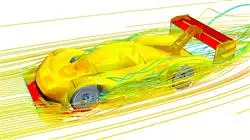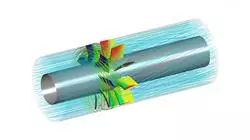University certificate
The world's largest faculty of engineering”
Introduction to the Program
With TECH's 100% online program, you will be able to study from anywhere and at any time, adjusting to your needs and schedules"

CFD Techniques for Predesign and Analysis are fundamental tools for Computational Fluid Mechanics in the design of complex systems. Their use has become essential for a wide range of fields, from automotive to aerospace and energy engineering. With the growing demand for high quality products and increased competitiveness in the industry, it is essential that professionals are trained in the latest techniques and tools in the field.
It is in this context that TECH has developed a Postgraduate certificate program in CFD Techniques for Predesign and Analysis that responds to the current needs of engineers in today's job market. In this way, the program offers comprehensive instruction in the use of advanced fluid simulation, modeling and analysis techniques, enabling professionals to improve efficiency, reduce costs and minimize environmental impacts. In addition, students will acquire specific skills in the selection and use of tools, as well as in obtaining coefficients and advanced time discretization methods.
This is an academic degree delivered in a 100% online format, which means that students can adapt their learning to their schedule and lifestyle. In addition, the teaching methodology used, Relearning, combines theory with practical exercises and complex simulated situations. In this way, students learn efficiently and dynamically, allowing them to integrate their knowledge in a natural and intuitive process.
Gain deep insights into the boundary layers of aerodynamics with this TECH academic degree, created by top experts in the field"
This Postgraduate certificate in CFD Techniques for Predesign and Analysis contains the most complete and up-to-date program on the market. The most important features include:
- The development of case studies presented by experts in Textile Engineering
- The graphic, schematic, and practical contents with which they are created, provide practical information on the disciplines that are essential for professional practice
- Practical exercises where the self-assessment process can be carried out to improve learning
- Its special emphasis on innovative methodologies
- Theoretical lessons, questions to the expert, debate forums on controversial topics, and individual reflection work
- Content that is accessible from any fixed or portable device with an Internet connection
TECH's 100% online learning methodology will allow you to study at your own pace, without interrupting your professional work"
The program includes in its teaching staff professionals from the sector who bring to this program the experience of their work, as well as recognized specialists from leading societies and prestigious universities.
Its multimedia content, developed with the latest educational technology, will provide the professional with situated and contextual learning, i.e., a simulated environment that will provide an immersive education programmed to learn in real situations.
The design of this program focuses on Problem-Based Learning, by means of which the professional must try to solve the different professional practice situations that are presented throughout the academic course. This will be done with the help of an innovative system of interactive videos made by renowned experts.
This Postgraduate certificate has the most advanced multimedia resources in the educational market: detailed videos, case studies or interactive summaries, among many others"

Deepen your understanding of aspects such as turbulent structures through this TECH program and advance your career immediately"
Why study at TECH?
TECH is the world’s largest online university. With an impressive catalog of more than 14,000 university programs available in 11 languages, it is positioned as a leader in employability, with a 99% job placement rate. In addition, it relies on an enormous faculty of more than 6,000 professors of the highest international renown.

Study at the world's largest online university and guarantee your professional success. The future starts at TECH”
The world’s best online university according to FORBES
The prestigious Forbes magazine, specialized in business and finance, has highlighted TECH as “the world's best online university” This is what they have recently stated in an article in their digital edition in which they echo the success story of this institution, “thanks to the academic offer it provides, the selection of its teaching staff, and an innovative learning method aimed at educating the professionals of the future”
A revolutionary study method, a cutting-edge faculty and a practical focus: the key to TECH's success.
The most complete study plans on the university scene
TECH offers the most complete study plans on the university scene, with syllabuses that cover fundamental concepts and, at the same time, the main scientific advances in their specific scientific areas. In addition, these programs are continuously being updated to guarantee students the academic vanguard and the most in-demand professional skills. In this way, the university's qualifications provide its graduates with a significant advantage to propel their careers to success.
TECH offers the most comprehensive and intensive study plans on the current university scene.
A world-class teaching staff
TECH's teaching staff is made up of more than 6,000 professors with the highest international recognition. Professors, researchers and top executives of multinational companies, including Isaiah Covington, performance coach of the Boston Celtics; Magda Romanska, principal investigator at Harvard MetaLAB; Ignacio Wistumba, chairman of the department of translational molecular pathology at MD Anderson Cancer Center; and D.W. Pine, creative director of TIME magazine, among others.
Internationally renowned experts, specialized in different branches of Health, Technology, Communication and Business, form part of the TECH faculty.
A unique learning method
TECH is the first university to use Relearning in all its programs. It is the best online learning methodology, accredited with international teaching quality certifications, provided by prestigious educational agencies. In addition, this disruptive educational model is complemented with the “Case Method”, thereby setting up a unique online teaching strategy. Innovative teaching resources are also implemented, including detailed videos, infographics and interactive summaries.
TECH combines Relearning and the Case Method in all its university programs to guarantee excellent theoretical and practical learning, studying whenever and wherever you want.
The world's largest online university
TECH is the world’s largest online university. We are the largest educational institution, with the best and widest online educational catalog, one hundred percent online and covering the vast majority of areas of knowledge. We offer a large selection of our own degrees and accredited online undergraduate and postgraduate degrees. In total, more than 14,000 university degrees, in eleven different languages, make us the largest educational largest in the world.
TECH has the world's most extensive catalog of academic and official programs, available in more than 11 languages.
Google Premier Partner
The American technology giant has awarded TECH the Google Google Premier Partner badge. This award, which is only available to 3% of the world's companies, highlights the efficient, flexible and tailored experience that this university provides to students. The recognition as a Google Premier Partner not only accredits the maximum rigor, performance and investment in TECH's digital infrastructures, but also places this university as one of the world's leading technology companies.
Google has positioned TECH in the top 3% of the world's most important technology companies by awarding it its Google Premier Partner badge.
The official online university of the NBA
TECH is the official online university of the NBA. Thanks to our agreement with the biggest league in basketball, we offer our students exclusive university programs, as well as a wide variety of educational resources focused on the business of the league and other areas of the sports industry. Each program is made up of a uniquely designed syllabus and features exceptional guest hosts: professionals with a distinguished sports background who will offer their expertise on the most relevant topics.
TECH has been selected by the NBA, the world's top basketball league, as its official online university.
The top-rated university by its students
Students have positioned TECH as the world's top-rated university on the main review websites, with a highest rating of 4.9 out of 5, obtained from more than 1,000 reviews. These results consolidate TECH as the benchmark university institution at an international level, reflecting the excellence and positive impact of its educational model.” reflecting the excellence and positive impact of its educational model.”
TECH is the world’s top-rated university by its students.
Leaders in employability
TECH has managed to become the leading university in employability. 99% of its students obtain jobs in the academic field they have studied, within one year of completing any of the university's programs. A similar number achieve immediate career enhancement. All this thanks to a study methodology that bases its effectiveness on the acquisition of practical skills, which are absolutely necessary for professional development.
99% of TECH graduates find a job within a year of completing their studies.
Postgraduate Certificate in CFD Techniques for Predesign and Analysis
In a world increasingly focused on efficiency, accuracy in the pre-design and analysis of projects becomes essential. That is why at TECH Global University we have developed a university course specialized in CFD techniques, focused on providing professionals with the necessary tools for a correct design and analysis of systems through the use of numerical simulations.
This program will address the fundamentals of computational fluid mechanics, which will allow the professional to understand the importance and application of simulation techniques in the prediction of phenomena and behaviors in different systems. In addition, the handling of specialized CFD software such as ANSYS Fluent and OpenFOAM, which will allow the professional to perform numerical simulations and analyze the results, will be covered in depth. Likewise, topics such as geometric modeling, definition of boundary conditions and validation of results through comparison with experimental data will be addressed.







